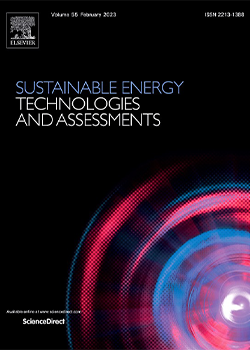
Feasibility of a residential solar photovoltaic in Cameroon. Journal of Sustainable Energy Technologies and Assessment.
Year of publication: 2015
Authors: Etongo, D.; Djenontin, I.N.S.; Kanninen, M.; Fobissie, K.; Korhonen-Kurki, K.; Djoudi, H.
Abstract
This paper presents a feasibility study of stand-alone solar photovoltaic (PV) systems for the electrification of three residential case study buildings (T4, T5 and T6) in the capital city of Yaoundé, Cameroon. The system was sized taking into account the load of the buildings and the available energy from the sun. The power, area of PV modules and daily energy generated by the PV for T4, T5 and T6 were respectively determined as: 2103 W, 14 m2 and 9.8 kW h/day; 3779 W, 25.2 m2 and 17.6 kW h/day; and 2766 W, 18.4 m2 and 12.9 kW h/day. The battery bank capacity, size of inverter and controller were respectively obtained as: 40,323 W h, 635 W and 93 A for T4; 72,433 W h, 795 W and 156 A for T5; and 53,017 W h, 826 W and 114 A for T6. The life cycle cost and annualized life cycle cost (ALCC) of the systems were respectively found to be: €15,714 and €1039 for T4; €27,227and €1800 for T5; and €20,006 and €1322 for T6. The average unit electricity cost for T4, T5 and T6 was respectively determined to be €0.52 kW h−1, €0.50 kW h−1 and €0.51 kW h−1, higher than the unit cost of residential grid electricity in Cameroon.
